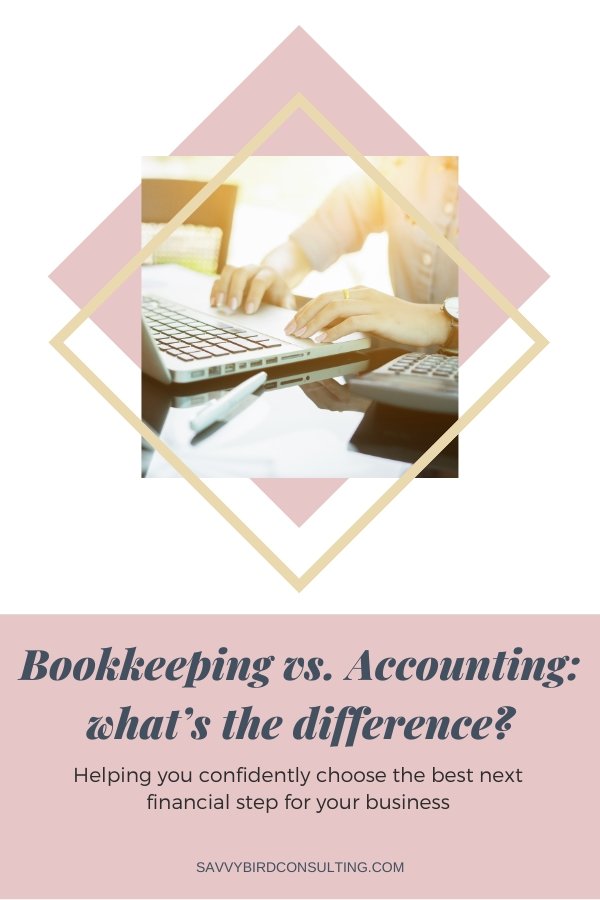Accountant or Bookkeeper: What do I need?
We know it’s easy to confuse these two terms and professions. In fact, for most small businesses, entrepreneurs and creatives, it’s just plain confusing. They feel like the same thing…so what’s the difference?
Read on, friends! We’re here to help provide you with some much-needed clarity about bookkeeping and accounting. We’ll also show you what we do and don’t do at Savvy Bird Consulting, so you can be confident in choosing the best next financial step for your business.
What is the difference between a bookkeeper and accountant?
First, it will be good to provide a general definition of what a bookkeeper does compared to an accountant. Once we know these definitions, we’ll dive into the nitty gritty and help you gauge what might be best for your business.
What does a bookkeeper do?
One word: transactions. A bookkeeper is commonly in charge of processing all of your financial transactions – they look at all of the money coming into your business and all of the money going out of it, reconcile transactions, and ensure accuracy of financial reports and record keeping.
Bookkeepers can also be in charge of things like of ensuring that employees and contractors get paid accurately and on time.
What does an accountant do?
Think strategy. An accountant is an expert analyzer. They’ll take the information a bookkeeper provides and look at it with an eagle’s perspective (thousand-foot view) to see the whole picture. They discover patterns in your finances and can recommend different courses of action and adjustments based on what’s working well and what isn’t.
An accountant will help you learn how your business is trending financially and will tell you whether you’re profiting or actually losing money.
Bookkeepers and accountants both provide important parts of your financial business framework.
Is it better to have a bookkeeper or an accountant?
There isn’t a simple answer to this question. We recommend our clients use a qualified tax preparer for their income tax returns, but these tax preparers don’t need to be an accountant (CPA). Your tax preparer could be an Enrolled Agent (EA), someone who is legally allowed to represent you in front of the IRS.
Once things start getting outside of your knowledge-base and you don’t have time to research and learn how to take care of it on your own, we recommend bringing in a larger support team.
If you're wanting to grow your business, create budgets (and strategies to meet them!), or do tax planning, it may be wise to bring in an accountant.
If you want to get away from recording and tracking all of your financial transactions yourself, it’s time to hire a professional bookkeeper!
Do I need an accountant for bookkeeping?
Generally, no. The most important thing we recommend is having a team that works together and communicates well with each other. Ensuring that your bookkeeper is able to reach out to your CPA with questions will be a huge help during tax season.
Your bookkeeper will likely run into things beyond their knowledge when it comes to business deductions, so they'll need input from your CPA.
Should I start with bookkeeping or accounting?
We believe bookkeeping is best the place to start. An accountant won’t be able to move forward until your books are clean and accurate! :)
What’s best for my small business?
Truthfully, only you will know best, but we can offer some advice.
If you’re looking for some basic financial structure and need someone to help you keep track of where your money is going and what’s happening to it, a bookkeeper is likely the best next step for you.
If you have your finances under control - you’ve got your t’s crossed and i’s dotted - but need someone to help you look at the financial picture and provide some strategic insight, it’s likely an accountant is your next best step.
What does SBC do?
Our main focus is on the bookkeeping side of things, with a specific emphasis on QuickBooks training.
We’re not certified public accountants (CPAs), so we won’t do your taxes for you. We also won’t provide all the strategy you’d be looking for from an accountant, but we can help to provide a solid structure for any accountant you hire (and we can recommend some pretty great accountants - just reach out to us and we’ll be happy to share).
When it comes to bookkeeping services, SBC goes the extra mile and provides an abundance of valuable insight.
SBC Founder Kayla Prusinski spent 7 years working under a team of CPAs, preparing financial statements, forecasts and tax returns for self-employed individuals, partnerships, corporations and trusts.
Because of this experience SBC is able to offer extensive knowledge and a wealth of additional information for your business that goes beyond what other bookkeepers are able to provide.
If you have any more questions about SBC or the services we offer, check out our FAQs >
We hope you enjoyed this blog and found it helpful. If you have further questions or suggestions for content you’d like to see us provide here, get in touch with us and we’d love to help.
No assurance is given that the information provided in this blog is comprehensive in its coverage or that it’s suitable in dealing with each individual’s particular situation. This blog article exists to provide general information only and does not constitute tax or legal advice, and cannot be used or substituted for tax or legal advice. Savvy Bird Consulting, LLC is not responsible for the implementation or outcomes this material may have.


